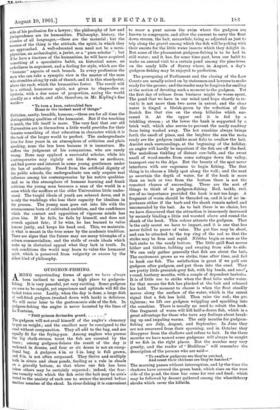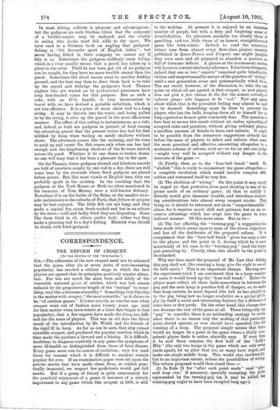GUDGEON-FISHING.
AMONG unpretending forms of sport we have always been inclined to assign a high place to gudgeon. fishing. It is very peaceful, yet very exciting. Some gudgeon are sure to be caught, yet experience and aptitude will fill the basket twice over. Lastly, when the day is done, a large dish of well-fried gudgeon (washed down with hock) is delicious. We will recur later to the gastronomic side of the fish. In gudgeon-fishing the angler is never haunted by the lines of La Fontaine,
" Petit poisson deviendra grand,
The gudgeon will not avail himself of the angler's clemency to put on weight; and the smallest may be consigned to the creel without compunction. They all add to the .bag, and are equally fit for the frying-pan. Among anglers who pursue' the big chalk-stream trout the fish are counted by the brace;. among gudgeon-fishers the result of the day is reckoned in dozens, and four or six dozen is not an excep- tional bag. A gudgeon '4 in.- or 5 in. long is full -grown, and bin. is not often surpassed. They thrive and multiply both in rivers and clean ponds, feeding'as a rule in shoals on a gravelly bottom, . so that where one fish has been taken others may be certainly expected ; indeed, • the fear- less voracity with which the fish seize the bait may be attri. huted to the 'anxiety of each one to secure the mordel before another member of the shoal. In river-fishing it is.convenient• to moor a punt across the swim where the gudgeon are known to congregate, and allow the current to carry the float down stream, the bait, meanwhile, being so adjusted as just to trip along the gravel among which the fish will be poking with their snouts for the little water insects which they delight in. But some of the pleasantest gudgeon-fishing is to be had in still water; and it has, for some time past, been our habit to make an annual visit to a certain pond among the pine-trees on the sandy hills of Surrey where, in August, a day's gudgeon-fishing may be enjoyed to perfection.
The proroguing of Parliament and the closing of the Law Cowie are usually seized on by statesmen and lawyers to make ready for the grouse; and the reader may be forgiven for smiling at the notion of devoting such a moment to the gudgeon. Yet the first day of release from business might be worse spent. The pond that we have in our mind (and hope shortly to re- visi t) is not more than two acres in extent, and the clear water is tinged a bluish-green by the reflection of the Scotch firs that rise on the steep hillsides which sir. round it. At the upper end it is fed by a. trickling stream ; at the lower the bank is supported by a brick wall, which also serves to prevent the sandy roadway from being washed away. The hot sunshine always brings forth the smell of pines, and the brighter the sun the more. ready are the gudgeon (unlike most fish) to swallow the bait. Amidst such surroundings, at the beginning of the holiday,' an angler will hardly be impatient if the fish are off the feed. The melodious tinkling of distant cow-bells, and the sweet smell of wood-smoke from some cottages down the valley. transport one to the Alps. But the beauty of the spot never interferes with our eagerness to begin fishing. The first thing is to choose a likely spot along the wall ; and the next to ascertain the depth of water, for if the hook is more than an inch or two from the bottom there is not the remotest chance of succeeding. These are the sort of things to think of in gudgeon-fishing. Rod, tackle, reel, are of no importance provided the hook is not too large, A fragment of worm should be threaded on, and it is of no im- portance either if the barb and the shank remain naked and unconcealed by the bait. As to bait there is no choice, but we have discovered that the attraction is immensely increased by securely binding a little red worsted above and round the shank of the hook. This colour attracts the gudgeon. That is the only secret we have to impart, and it is one that has never failed to prove of value. The gut line may be short, and can be attached to the top ring of the rod so that the strike may be firm and rapid. Nibbles begin as soon as the bait sinks to the sandy bottom. The little quill float moves hither and thither, bobbing and swaying from side to side. We can only gather generally that fish are about the bait. The excitement grows as we strike, time after time, and fail to hook our fish. The satisfaction is great if we' pull out gudgeon after gudgeon, and put them into the creel. They are pretty little greenish-grey fish, with big heads, and smal', round, leathery mouths, with a couple of dependent barbules. It is of little use to strike when the float bobs under water, for that means the fish has plucked at the bait and released his hold. The moment to choose is when the float steadily moves along the surface of the water, which is the surest signal that a fish has hold. Then raise the rod; the gut tightens ; we lift our gudgeon wriggling and sparkling into the sunshine. There is usually no need to rebait the hook. One fragment of worm will kill half-a-dozen fish, which is a great advantage for those who have any feelings about break- ing up and impaling worms. The only months for gudgeon- fishing are July, August, and September. In June they are not recovered from their spawning, and in October they disappear from the shallows and refuse to bait. In the three months we have named some gudgeons will always be caught if we fish in the right places. But the number may vary greatly, and the reader of " Hudibras " will remember the description of the persons who are said— .
"To swallow gudgeons ere they're cached, And count their chickens ere they're hatched." The morning passes without interruption, and by the time the shadows have covered the green bank, which rises on the west side of the pcnd, the time has come for rest and food; which may be followed by dessert gathered among the whortleberry shrubs which cover the hillside.
In most fishing solitude is pleasant and advantageous; bttt the gudgeon are such fearleis biters that the eompanY of a brother-angler may be endured, and the* riVah7 in seeing who hooks most fish • adds to the sport.. We have read in a -German book on .angling that ,gudgeon- fishing is ,"the favourite sport of English ladies."; but never- having fished in their company we cannot say if this is so. Sometimes the gudgeon sUddenly.-ceage biting, which in a river usually means that a 'Perch. has taken up a place-in the swim:- Until he has been got rid Of no gageOn can be caught, for they have no more terrible* enemy than the perch. Sometimes the shoal moves away to . another feeding ground, and the best way then to draw theni back is to rake up the: gravel and dislodge the gudgeon's food.. Thames anglers who are - waited on by -professional pUntsmen have long iron-headed -rakes: for this. purpose. But as such a rake: with• an IS ft. handle, is very inconvenient to tratel with, we have -devised a portable substitute, which. is not less effective. It is a piece of stout chain tied to a long string.' It may be thrown into-the water, and, being pulled in by the string, -it stirs up the -gravel in the most efficacious manner. • -The effect of this raking is instantaneous, as a rule, and, indeed, so bold are gudgeon • in pursuit of food among the stirred-up gravel that the present-writer has had his feet nibbled -•by them' when wading on sandy shallows without shoes.• The afternoon passes like .the morning, and the time to pack *up and count 'the fish comes only when one has had enough and tba lengthening shadows of the-fir-trees stretch across the pond. Whether it be one doien or twelve dozen, no one will deny that it has been a pleasant day in the open.
On the Thames, where gudgeon aboUnd and fabulous records are told of numbers caught by one rod in a day, there are still some inns by -the riverside 'where fried gudgeon are placed before guests. - But, like most viands at English inns, they are probably spoilt in the cooking. In the -coaching days the g4dgeon at the York House, at Bath (so often mentionedin the memoirs of Tom Moore), were a well-known delicacy. Nowadays it is, on the hanhs of the Seine, at the smaller river- gide restaurants in tlie suburbs of Paris, that fr./tare de gaujons .may be. best enjoyed. The little fish are not bony; and they • make a capital fry, oatenfresh-Cooked and hot in an -arbour • hyr,' the river,—cold and badly fried they are disgusting. Some like them fried in oil, others prefer, lard; either way they make a pleasing end to a day's fishing. Rhenish wine should be drunk with fried gudgeon.



































 Previous page
Previous page